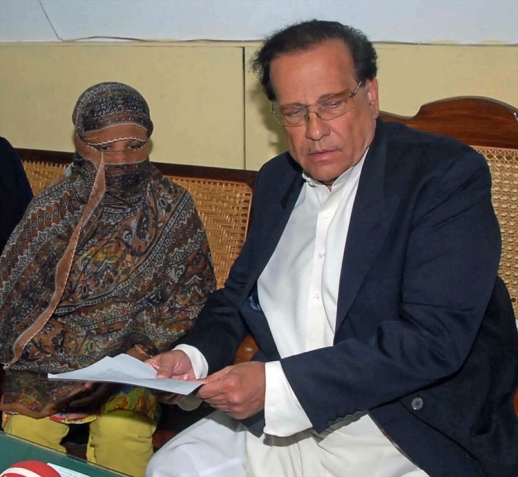
The apex court in Pakistan has kept intact the death sentence of a man who murdered the former governor of the Punjab for seeking reforms in the blasphemy law and supporting Asia Bibi, a Christian woman condemned to death for allegedly committing blasphemy.
The governor, Salmaan Taseer, was shot and killed by Mumtaz Qadri, a member of his own security detail, in Pakistan’s capital, Islamabad, on 4 January, 2011. Twenty-six-year old Qadri shot the governor 27 times without being intercepted by other police officers present at the crime scene. Then he threw down his AK-47 sub-machine gun and reportedly pleaded to be arrested so that he could explain his intentions.
The Supreme Court of Pakistan on 7 October upheld the decision of the trial court and the Islamabad High Court and rejected the appeal against Qadri’s death sentence. Qadri’s lawyers had maintained that because the governor called the blasphemy laws “black law”, Qadri had the right to kill him. A day before, Supreme Court Justice Asif Saeed Khosa, while discussing the case, remarked that “criticizing blasphemy laws does not amount to committing blasphemy” and that Qadri had no legal justification to take the law into his own hands.
Aasiya Noreen, commonly known as Asia Bibi, was arrested in the summer of 2009 for allegedly speaking ill against the Prophet of Islam and has already spent six years in prison. Her appeal in the Lahore High Court was rejected in October 2014 but at the same time the judges identified a technical loophole in the blasphemy law. In July 2015, Noreen was allowed to take her appeal against her death penalty to Pakistan’s Supreme Court in Islamabad. No decision has yet been made and the case is pending to be heard by the court.
Saif-ul-Malook, who will represent Noreen in the Supreme Court, also represented the prosecution in Taseer’s murder case.
Talking to World Watch Monitor, Malook hailed this latest decision to uphold Qadri’s death sentence, saying it was a victory for those who are fighting terrorism.
There was no other lawyer ready to represent Qadri’s prosecution due to severe threats from hardliners. Malook said the Supreme Court of Pakistan, especially Justice Khosa, “had written a new judicial history in Pakistan by passing this judgment”.
“This is a victory for those who are fighting terrorism, and international forces that are accusing Pakistan of not sufficiently dealing with terrorism should see this judgment,” he said.
“The judgment has also sent a strong message that the former chief justice of the Lahore High Court (LHC), Khawaja Muhammad Sharif, and former senior judge of LJHC, Mian Nazeer Akhtar, who represented Qadri and justified the killing of the former governor, were not speaking in accordance with the Constitution of the Islamic Republic of Pakistan.”
The trial judge, Pervez Ali Shah, who convicted Qadri in October 2011, was sent to Saudi Arabi after he pronounced the judgment, for fear of his life.
Months before his murder, Taseer, a business tycoon and serving governor of the largest province in Pakistan, had caused anger by supporting Noreen, who was sentenced in November 2010. After Pope Benedict XVI pleaded for Noreen’s release, Taseer went to meet her in prison and had her sign an appeal to the President. The religious right in Pakistan carried out massive protests, demanding that Noreen should not be pardoned for any reason. Taseer also made headlines for demanding an amendment to Pakistan’s blasphemy laws. Only four days before his murder, Taseer tweeted:
I was under huge pressure sure 2 cow down b4 rightest pressure on blasphemy.Refused. Even if I’m the last man standing
— Salmaan Taseer (@SalmaanTaseer) December 31, 2010
Taseer’s body was flown from Islamabad to Lahore, his hometown, for his funeral but his family struggled to find a cleric to offer prayers at the funeral after more than 500 religious scholars issued an Islamic decree that it was unlawful to say funeral prayers for Taseer. The top official cleric backed off at the last moment from offering prayers. Taseer’s body was buried amid tight security, while, when Qadri was presented in the court, thousands showered him with rose petals and more than 2,000 lawyers were ready to represent him for free.
Taseer’s death divided the country on one hand, and silenced the critics of the blasphemy law on the other. The small, beleaguered Christian community, which suffered several communal riots, clearly saw their support sharply declining after Taseer’s death.
Taseer’s son, Shahbaz Taseer, was abducted by the Taliban in August 2011 and is still being held.
Despite having suffered so much for the cause of the Christian woman, Taseer’s elder sister said through a Facebook message: “It is not enough for the sentence on Qadri to be carried out – Asia [Bibi] for whom my brother died has to be released.”
The National Commission on Justice and Peace Executive Director, Cecil Shane Chaudhry, told World Watch Monitor that the Supreme Court’s decision had strengthened the fight against religious extremism. At least 150 Christians, 564 Muslims, 459 Ahmadis and 21 Hindus have been jailed under blasphemy charges since 1986. Chaudhry said that prior to 1986, only 14 cases pertaining to blasphemy were reported.
(For a view of this latest judgment from a former National Executive Secretary of the Justice and Peace Commission of Pakistan, who now edits the Minority Concern magazine, please click here).